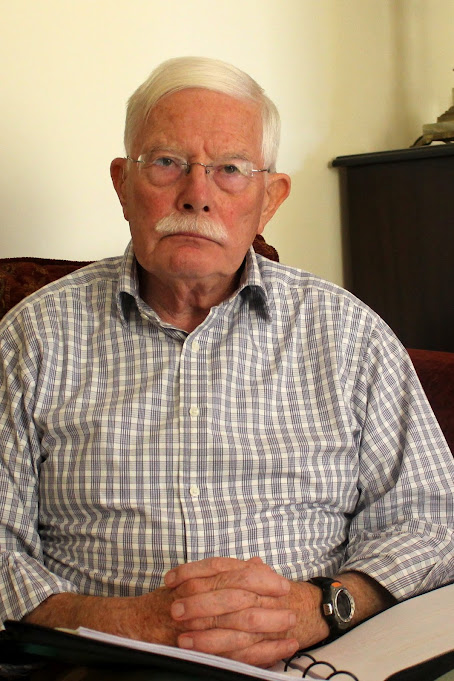Kilcullen soldier questions Israel's Gaza strategy
"Gaza is becoming a sort of a firing range. It's already an open prison, but now it's also a place where you can shoot at live targets."
That's the kind of opinion that means Des Travers can't get to Gaza via Israel or Egypt any more. And why a trawl on the internet using his name will bring up vitriolic stuff about him which for anyone who knows him just doesn't wash. But we're in the era of media by unquestioned soundbite. Of media where a professional Twitter and Facebook campaign can obliterate reasoned and accurate reporting in less time than it took for 11 Israeli artillery battalions to level a complete neighbourhood of Gaza City.
During this summer's Operation Protective Edge assault on Gaza by Israel, some 2,100 Gazans died, the majority being civilians, and a large number of those were children. Israeli losses were in no relation to that figure, with 66 soldiers killed and six civilians. The some 11,000 Gazans wounded were recorded as 70 percent civilian, while on the Israeli side, 469 soldiers and 256 civilians were wounded over the 50 days of conflict.
The blunt truth is, Des Travers believes, that Israel's government allowed its military to use a steamroller to squash a gnat. It allowed its soldiers to 'lose the plot' to provide a platform for vengeance that had no military rationale. Especially the shelling of Shujayea.
"It was an horrific, inexplicable, tactically irrational engagement," he says from the experience of his own long career in the Irish military, serving in hotspots like Cyprus, the Balkans, and Lebanon. "Enraged when they lost 11 men in an engagement, they shelled the neighbourhood of Shujayea for 24 hours, dropped 120 JDAM smart bombs and fired 7,000 shells into the suburban area. Even the American military was aghast at the tonnage of weaponry used, and when the American military is aghast, the rest of us have to stand back in horror."
During his testimony to the recent extraordinary session of the Russell Tribunal on Palestine, about the Israeli Operation Protective Edge, Des Travers showed video of the destruction of Shujayea, and likened it to what had been inflicted on Guernica or Dresden in past major wars.
"In my peacekeeping duties I have been under artillery fire at the rate of one shell every 30 seconds for an hour, two of which landed near me and killed two Nigerian officers in our group," he says. "It's shit-scaring stuff. And to have that rained down on women and children, and people who are infirm, and who can't vacate the area ... and with drones overhead, tracking people for further mortar fire as they fled, I have no doubt about what they were doing. They were trying to kill as many people as possible."
Col Des Travers has been studying the use of weaponry in the area in fine detail since the previous Israeli 'adventure' against Gaza, Operation Cast Lead which began on Christmas Eve 2008. "The munitions thrown at Shujayea in Gaza this year, in 24 hours, equalled all which were used over 21 days in Operation Cast Lead. Fired into an area which hadn't really had any history of violence or resistance to Israel."
Is this genocide, by a state which underpins most of its place in the modern world on having been the victim of Nazi genocide attempts as well? "The general agreement at the Russell Tribunal was that there were 'genocidal aspects' to the latest operation. I'm comfortable with that, because if you leap into the genocidal idea, against a media that is dominantly pro-Israel, you will be labelled 'criminally anti-semite'. The genocide argument is intellectually, culturally, emotionally a step too far at this stage."
Intellectually, that might not mean much to those Gazans under such bombardment. They couldn't flee anywhere, being under siege by the same Israeli system as was sending them text messages to leave their homes which were to be targets.
And they are likely to be again. Sooner rather than later, the Russell Tribunal was told last week. "An Israeli gentleman told us that the budget for the IDF had been doubled. He said 'I can tell you here and now that this means there will be another operation soon'." That's really bad news, because Des Travers has noted that the frequency of Israeli operations directly against Gaza is shortening drastically. "It used to be about every three years, now it's down to a year and nine months ..."
For Israel, it has never been a secret that financing its defence and offensive operations has very much been helped by funds from America, the country and its Jewish organisations. But whether that is money well spent is questionable, Des Travers believes. "I studied the Iron Dome missile defence system used by Israel since it was established in 2012 as a much-vaunted shield against Hamas rockets. In fact, it is a failure."
During the Protective Edge operation, Israel says it used the Iron Dome system only against incoming rockets which were considered a 'distant danger' to urban areas. Unlike Gaza, one of the most densely populated areas in the world, there are extensive non-urban areas within Israel's own land boundaries, where, reportedly, most rockets landed. "The Israelis themselves said that of those rockets they targeted, they knocked out 27 percent. Which isn't any success in itself, but one analyst I know, estimates the figure to be nearer 5 percent."
Anyone who knows anything about air defence would say that the system was suspect from day one. However, in the middle of Operation Protective Edge — which included the blanket shelling of a civilian suburb — the United States Congress voted $140m to replenish the anti-missile defence stocks. Which again raises the spectre of what US President Eisenhower, a former chief of staff of the US Army, warned about in 1960. "We must guard against the acquisition of unwarranted influence, whether sought or unsought, by the military-industrial complex," the President said just before he left office. "The potential for the disastrous rise of misplaced power exists and will persist. We must never let the weight of this combination endanger our liberties or democratic processes."
"We should have listened then," Des Travers says. "The only rational reason for many local wars since, and the development and testing of ever more lethal weaponry, is because somebody, somewhere, is making a buck out of it."
(This is one of a number of articles which the Diary will publish based on an in-depth interview with Col Des Travers when he came back from testifying to the Russell Tribunal on Palestine last week.)
































